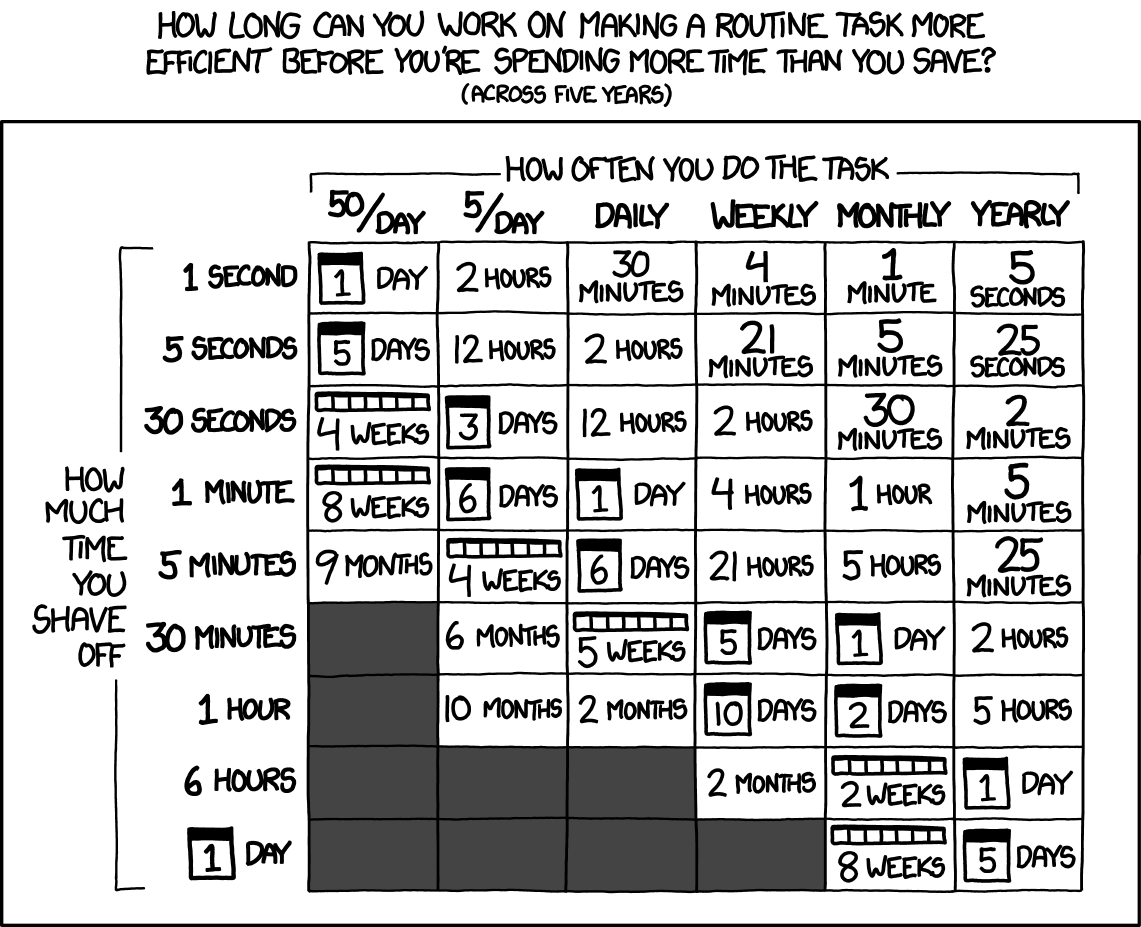This site has good benchmarking of unoptimized and optimized code for several languages. C+ blows Python away. https://benchmarksgame-team.pages.debian.net/benchmarksgame/index.html
BCsven
Agreed. Or look at the manual effort, is it worth coding it, or just do it manually for one offs. A coworker would code a bunch of mundane tasks for single problems, where I would check if it actually will save time or I just manually manipulate the data myself.
I will add if you send a proton encrypted email to a non proton user they get like a weblink version that decrypts for viewing. And it has an expiration date.
Because when it is to actually get paid work done, all the bloat adds up and that 3 days upfront could shave weeks/months of your yearly tasks. XKCD has a topic abut how much time you can spend on a problem before effort outweighs productivity gains. If the tasks are daily or hourly you can actually spend a lot of time automating for payback

And note this is one instance of task, imagine a team of people all using your code to do the task, and you get a quicker ROI or you can multiply dev time by people
A few for different use cases. NixOS on my wife's 14 year old laptop because it proved to handle the hardware the best, and she struggles with change so if that system dies the NixOS configuration can be redeployed identical to how she had it with no additional effort.
Debian on my old IOmega NAS.
OpenSUSE on my personal PC and Work computer, since it supports my proprietary CAD software, and nVidia releases a driver specifically for SUSE/OpenSUSE use.
Some of thaose restrictions get stupid. We had a client ship us their hardware and they included Laser Mouse on the manifest. The US border controls would not allow delivery due to a Laser being included LOL. Had they just entered it as a Mouse the package would have been delivered.
Wow that is a gorgeous image
I meant the USB power coming from dock to charge port on laptop. If you mean USB (thunderbolt) out for display then it migtht not be bidirectional for power. My HP has a USB-C thunderbolt but the power cord has the USBC and barrel power in one plug since the USBC can't charge the laptop.
USB Cable connection, power failing? Is drive set to power down on idle and then falling off the radar?
WSL is fine for doing ssh type stuff or simple things but it is wonky for full distro use experience.
I have an HP zbook. Fan did that a few times, almost like it didn't recognize power control and defaulted to a higher fan speed. Booting to windows and then back to Linux fixed it. Not sure why.
Is the office and thee charge rated at enough wattage, and is the USB cable a heavy duty power cable intended for the machine or some cheap cable?

So Technically No. Our proprietary CAD was only supported and certified to work on RHEL or SUSE. I wanted to test before commiting to a distro. So I went with OpenSUSE leap since it shares SUSE binaries and has same release and service cycle. It installed and functions well on OoenSUSE While not identical to SUSE, I can say all the complaints I saw online of things not working in Linux were working for me. They sort of have to on a paid distro with support, so it seems to carry to OpenSUSE with the same binaries
2)btrfs works. I saw lots of complaints of people saying btrfs filled their drive, etc. SUSE / OpenSUSE as jobs establishes to monitor number and age of snapshots and remove automatically as needed as well as cleaning tools. It all runs behind the scenes.
I assume RHEL will also have these types of perks to make some aspects easier